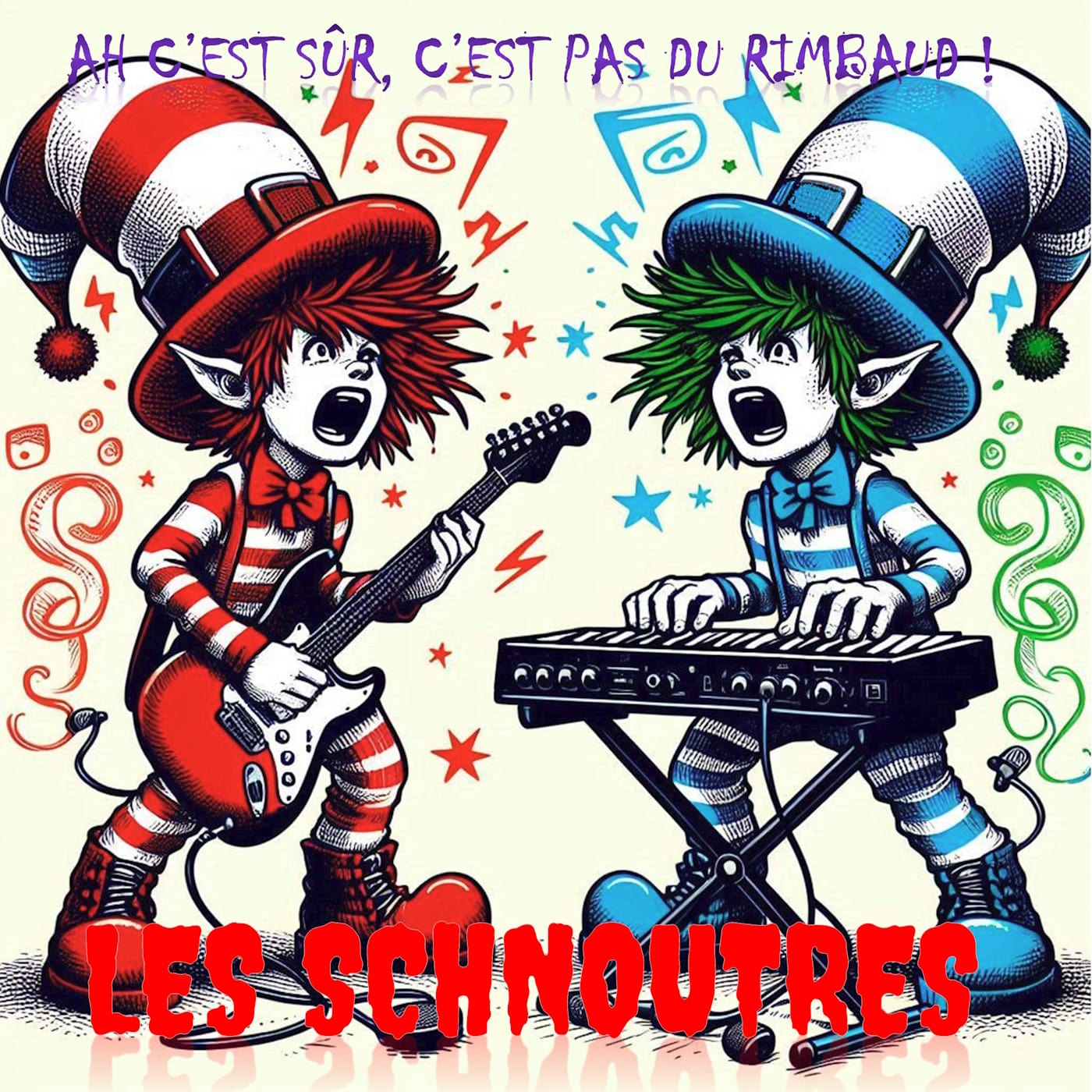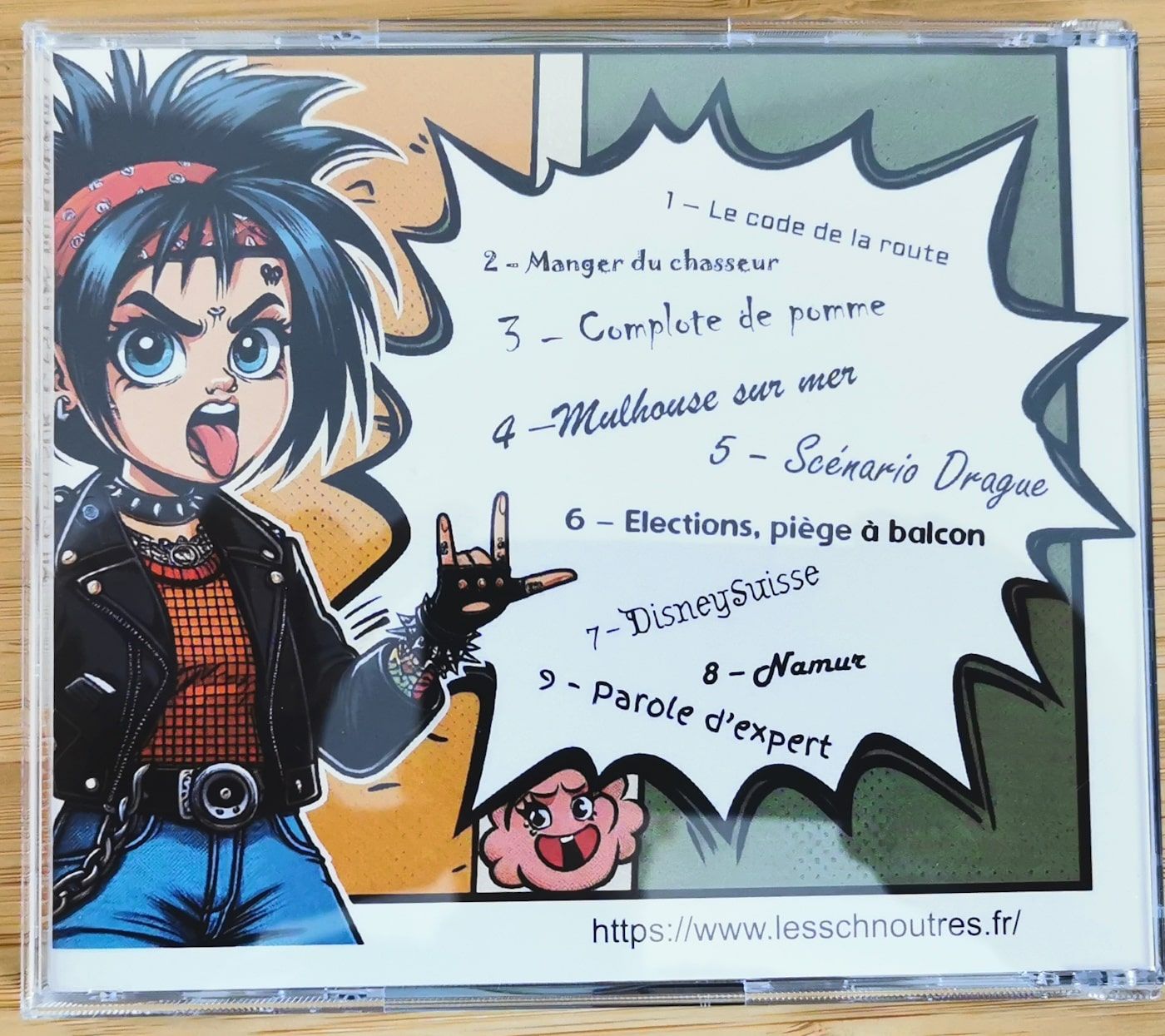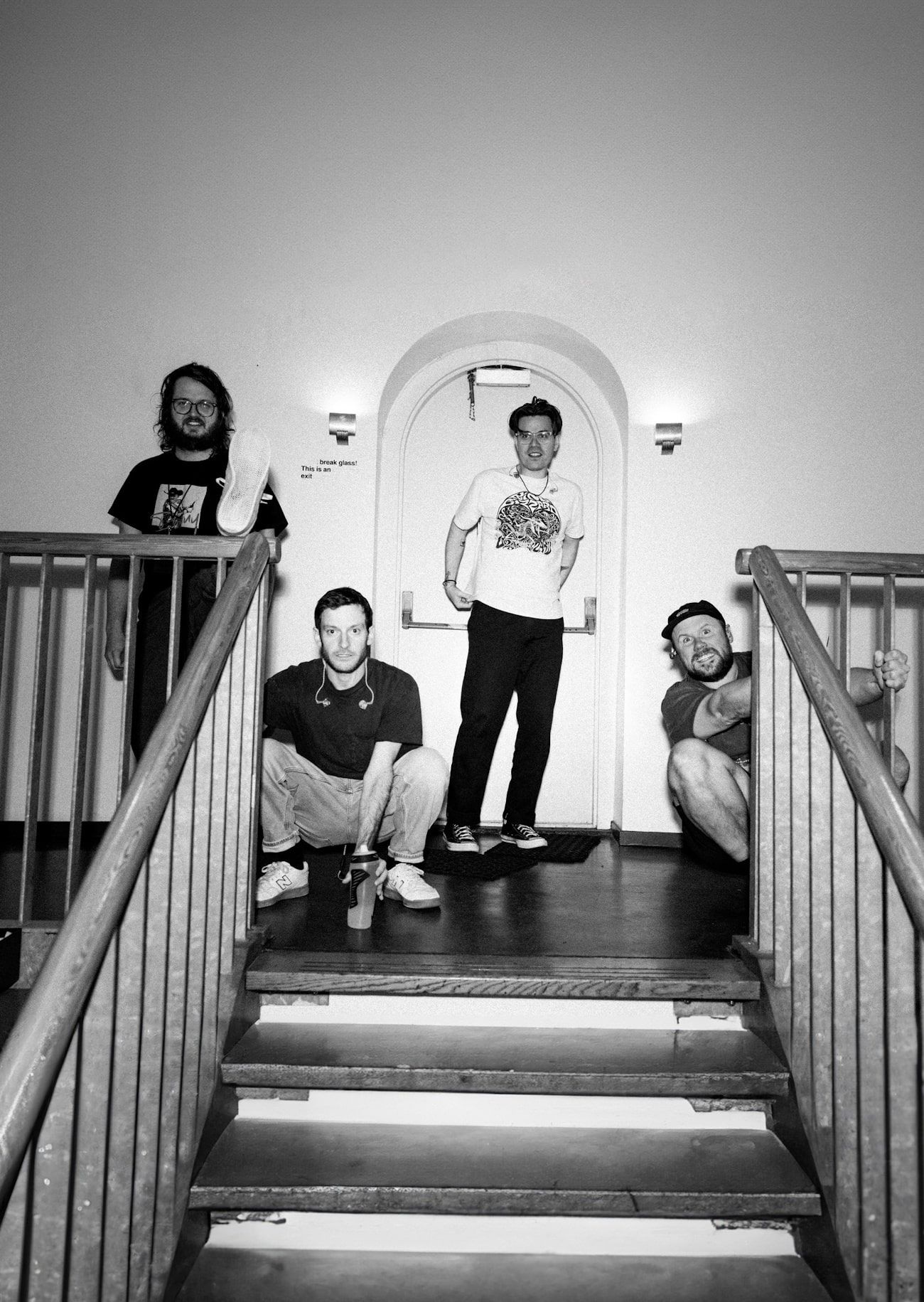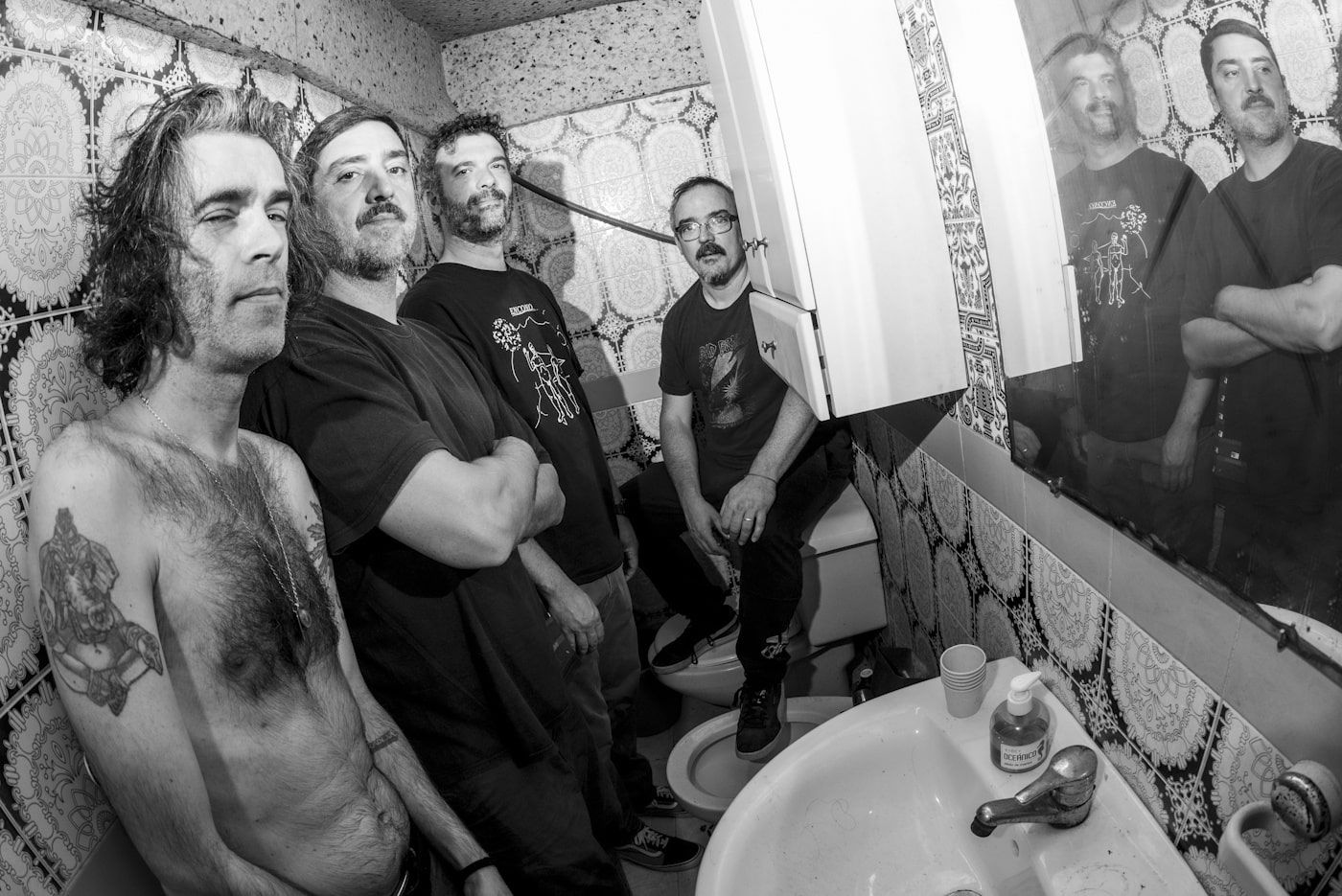Deep in Mulhouse’s industrial heart, Les Schnoutres redefine punk rock’s narrative with an offbeat twist. Formed in April 2024 by Oliv and Bouly—a duo once steeped in metal’s shadow—they pivoted to crafting music that’s as much about a good time as it is about clear, simple messages. Eschewing the expected electric guitar, the duo leads with an organ, its sound as unconventional as the band’s very name (an Alsatian term meaning “snot”), punctuating their commitment to local identity.
Their sound draws from pop punk legends like the Ramones and French acts such as Les Wampas, while nodding to 90s indie post-punk bands like La Mano Negra, Les Garçons Bouchers, and Les Négresses Vertes. Early demos—though a departure from their darker past—drew spontaneous smiles and tapping feet, setting the tone for what they call “festive punk.”
The duo’s approach is remarkably streamlined. Oliv pens the songs, and Bouly’s keyboards infuse them with a signature idiosyncrasy, enhanced by synthesizers that layer their organ-led sound. With a pre-composed drum machine and bass backtrack, their setup is as efficient as it is distinctive, whether they’re going electric or switching to an acoustic mode featuring guitar and accordion.
Les Schnoutres’ identity is inseparable from their regional roots. Their lyrics, peppered with French and Alsatian, lend an authentic voice that both embraces and pokes fun at local quirks. The debut album, Ah c’est sûr c’est pas du Rimbaud!—a nine-track record released in February 2024—captures this spirit. Tracks like Mulhouse sur mer playfully reimagine an industrial city as a seaside dreamland, while Complote de pommes skewers conspiracy theories. In Manger du chasseur, the band proclaims, “The fox is my friend, the wild boar is my friend… And together we’ll eat the hunter, with shallots and butter…” A nod to anti-hunting sentiments wrapped in sardonic humor, their other songs—Le code de la route and Election piège à balcon—offer pointed critiques of reckless driving and political farce.
Self-produced and independent, Les Schnoutres opt for simplicity in both music and message. They’re not overt activists; rather, they inject a measured cynicism into punk’s traditional subversion. While acknowledging that punk’s raw edge has mellowed in mainstream renditions, they argue that its capacity to challenge prejudice and institutional norms persists—if only with a wry smile.
Their visual aesthetic reinforces this playful rebellion. Comic-style illustrations reminiscent of children’s books capture a chaotic, unpretentious vibe—a deliberate departure from the darker imagery of past projects. Embedded in a vibrant underground scene bolstered by cross-border influences from Germany and Switzerland, the band rehearses at Le Noumatrouff, a hub for indie culture that unites local venues and associations like Artung, Zone51, and Aching.
Read the full interview below to explore the band background, musical influences, duo configuration, independent ethos, debut album and track details, punk’s evolving subversiveness, cover art choices, local scene dynamics, and even a few offbeat favorites.
Give us a quick overview of this project and some details on your background.
Oliv : Les Schnoutres was created in April 2024 by two musicians, Oliv’ and Bouly, who met in a previous band. The founding idea of Les Schnoutres was to play music that makes you want to party, while also conveying some messages with simplicity. This desire arose after years of metal and dark music, following which we craved some lightheartedness. Hence the identification of our music as ‘Festive Punk’.
What are your influences?
Oliv : Our influences are drawn from pop punk (like the Ramones, and in France, Les Wampas, etc.) and indie rock from the post-punk era, particularly French indie bands from the 90s (La Mano Negra, Les Garçons Bouchers, Les Négresses Vertes, etc.).
When we played the first demos for people around us, it immediately caught on. This doesn’t mean that everyone who knew us from our ‘dark’ side liked the music of Les Schnoutres, but everyone was grinning and tapping their feet… This convinced us to continue in this direction.
Bouly : I would describe what we do as songs with humorous lyrics, lively music, rock and punk-rock rhythms, and the desire to convey a festive mood to the audience. A unique feature is the nod to our region, Alsace, with its little references in our lyrics.
Why did you choose a duo configuration?
Oliv : I write the songs, and Bouly adds his personal touch on the keyboards. From the beginning, we wanted to have a distinctive sound, which is why the lead instrument is an organ, and in some pieces, a synthesizer that gives a particular tone to the sound of Les Schnoutres.
On stage, we play with a backing track that we composed with the drums and bass.
One advantage of staying a duo is that everything is simpler in terms of organization, and since we are both musically in sync, composing and rehearsing goes faster.
Bouly : I think it’s cool to go on stage as a duo, with all the ‘responsibility’ that entails; basically, it’s a small risk.
What is the spirit of the group?
Oliv : We are an independent and self-produced band, and we do not intend to change that, especially given that the flexibility of the tools we use (DAW, etc.) allows us this comfort.
Bouly: What is crucial, I think, is the essence of Les Schnoutres: not taking ourselves too seriously.
Oliv: For your information, the word ‘Schnoutre’ comes from Alsatian (a dialect from eastern France, where we originate) and means ‘snot.’ This is what the group’s logo represents… We are attached to our identity, and all our titles are in French, sometimes with Alsatian words here and there. This might be a barrier for non-French-speaking listeners who may not understand us, but after all, there is also the music, which is a universal language!
What led you to this stage, and how do you see your growth so far?
Oliv : We are a young band, and in 2024, we focused our efforts on writing, rehearsing, and recording our first album, which has just been released.
For the years 2025 and 2026, we will focus on performing live, while continuing to write new songs.
Can you share a wider perspective on your upcoming releases?
Oliv : The first album by Les Schnoutres was released in February. The name of this album is ‘Ah c’est sûr c’est pas du Rimbaud!’ (Ah, sure, it’s not exactly Rimbaud! – 9 tracks). We distribute it as a CD at our concerts and gradually release the tracks one by one on music platforms. We also plan to release a new album by the end of 2025.
The first tracks we have released so far are:
Mulhouse sur mer: This title speaks about our hometown, Mulhouse. Mulhouse is a former industrial city known for its textile mills and fabric printing factories. There are still entire neighborhoods from the 19th century with small workers’ houses and old factory buildings, some of which have been converted into offices. One of them is now an artists’ community (https://www.motoco.fr/) that regularly hosts indie events (concerts, independent publishing fairs, etc.). Some even call Mulhouse the ‘French Manchester.’
All of this, along with Mulhouse’s suburbs, gives the city a somewhat ‘gray’ feel, despite some very pleasant and lively aspects. The song playfully ironizes this ‘gray’ side by mentioning the ‘sea’ and ‘palm trees’ that don’t exist in Mulhouse, and a guy dreaming by the Mulhouse canal, imagining himself in Tahiti (for your information: Mulhouse is more than 600 km from the nearest beach).
Complote de pommes (untranslatable play on words) : It’s a song about conspiracy theories that pokes fun at people who claim the Earth is flat (‘It doesn’t suit my plans, I wanted to travel around the world’) or who believe the world is run by reptilians, etc.
Manger du chasseur (« Eating the hunter ») : An anti-hunting song. We try to convey the message in a somewhat humorous way (‘The fox is my friend, the wild boar is my friend… And together we’ll eat the hunter, with shallots and butter…’)
Le code de la route (« Traffic Laws ») : It’s a somewhat ironic song about reckless drivers. No real message, just derision.
Election piège à balcon: It talks about old anarchists watching people go vote from their balcony while drinking beers. There’s obviously a play on words between the french expression ‘ Elections piège à cons’ (“Elections: a scam for suckers.”) and the word ‘balcon’.
The other tracks will be released in the coming months.
Does punk still carry a subversive message?
Oliv : Generally speaking, punk is an engaged movement. In that sense, Les Schnoutres are no exception, but we don’t define ourselves as an ‘engaged’ band in the sense of being openly activist. We try to bring a bit of lightness to the messages we convey in our lyrics. Cynical? Maybe a little…
We believe punk has lost some of its subversive edge over time (Crass or Dead Kennedys have been replaced by more mainstream punk like Green Day). But punk is part of a broader movement that challenges prejudices and criticizes institutions—a movement connected to environmental and anti-capitalist struggles (like Occupy Wall Street and similar movements). Yet, paradoxically, in a time of widespread reactionary backlash, punk—even in its mainstream form—regains a subversive element through its openness and tolerance, standing in stark opposition to the prevailing discourse of identity-based tension.
What’s the story behind your cover art?
Oliv : Most of the illustrations (whether on the CD, in the videos, or on streaming platforms) are comic-style drawings, similar to children’s comics. We want to convey the slightly chaotic, lighthearted, and unpretentious side of our band through these drawings.
Bouly : Again, we want to move away from the ‘dark’ aesthetic we had in previous years with other bands. That’s something we’re deliberately stepping away from.
local alternative and underground scene.
Oliv : The local and alternative scene in Alsace, where we’re from, is quite active. This is due to several factors: first, the immediate proximity (just a few kilometers) to Germany and Switzerland, which gives it an international edge. This allows alternative music fans to look beyond borders for artists that suit their tastes.
Then, there’s the fact that several clubs and local associations are really putting in the effort to keep the scene alive. We, Les Schnoutres, rehearse at a studio called ‘Le Noumatrouff’ (https://www.noumatrouff.fr/) in Mulhouse, which has two concert halls—one for about 500 people and another for around 200. They regularly organize concerts featuring indie bands, including those who rehearse in their studios. Les Schnoutres are also planning an artist residency at Noumatrouff in 2025, which will conclude with a concert there. Noumatrouff is part of a network of independent venues that collaborate on artist programming. Other local associations like ‘Artung‘, Zone51, and ‘Aching‘ are also very active.
Likewise, within a 50-kilometer radius, there are several venues in Switzerland that program indie artists (Die Kaserne: https://kaserne-basel.ch/en, Holzpark, Konzertfabrik, Elsi) as well as in Germany, or further away in Strasbourg and Zurich.
Of course, there are also a lot of bands, so getting booked isn’t easy, and personal connections are key. People we’ve met in a ‘past life’ or mutual favors between bands—like ‘I have a gig, you can open for us, and in return, you help us out later’—that kind of thing.
To wrap things up, is there an artist you admire and a favorite pastime you enjoy?
Bouly: Pierre Bachelet and beeeeeeer!
Oliv: Oh dear! I’ll leave you to take responsibility for Pierre Bachelet (note: French singer. Don’t even try to listen…), and as for the beer, I’ll pour myself another one, here you go!












